Is hard-right Arizona Senate hopeful Blake Masters the next J.D. Vance?
When the news broke Tuesday night that “Hillbilly Elegy” author J.D. Vance had come from behind to win Ohio’s Republican Senate primary, perhaps no other politician in America was as giddy as Blake Masters.
“Senator J.D. Vance!” Masters tweeted. He followed up a few hours later with a photo of himself and Vance smiling in front of Trump International Hotel in Washington, D.C.
— Blake Masters (@bgmasters) May 4, 2022
Why was Masters so delighted? Because more than any other politician in America, Masters, a 35-year-old rookie candidate vying for Arizona’s Republican Senate nomination, hopes to be the next J.D. Vance.
And Vance’s victory could be just the boost he needs.
As the 2022 midterm elections approach, Ohio and Arizona are emerging as two key Senate races to watch. Previously a toss-up, Ohio has been moving rightward in recent elections, while Arizona — the state that launched John McCain and Barry Goldwater to the national stage — has been trending to the left.
If Republicans win both of these Senate contests by holding the open seat of retiring GOP moderate Rob Portman in Ohio and defeating Democratic incumbent Mark Kelly in Arizona, they will likely win back control of the Senate.
The similarities between Vance and Masters are legion, but mostly they boil down to “the three T’s”: Thiel, Tucker and Trump.
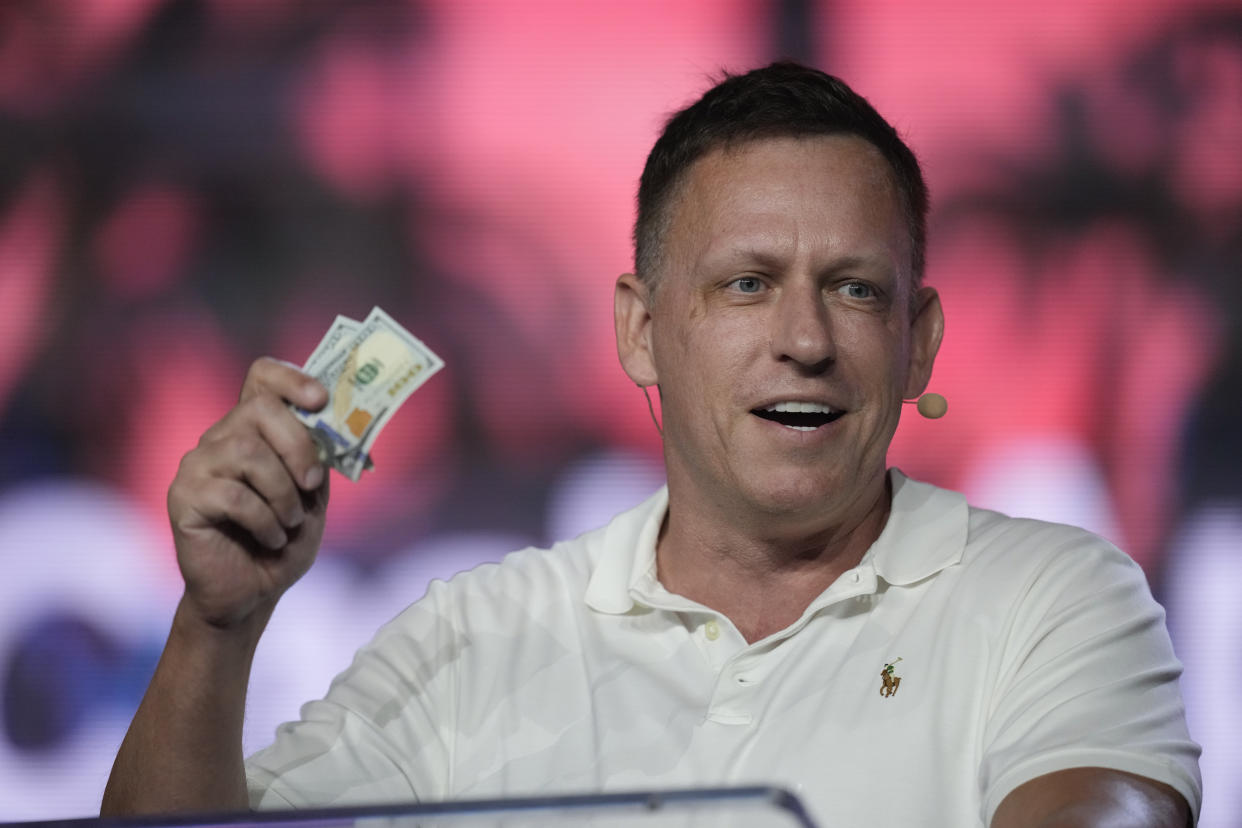
Like the Yale Law-educated Vance — who in 2016 compared Donald Trump to “cultural heroin” and predicted he would “lea[d] the white working class to a very dark place” — the Stanford-bred Masters (BA, JD) experienced his own change of heart as Trump rose to power, eschewing the libertarianism of his youth and embracing Trump’s “Make America Great Again” rhetoric instead.
Like Vance, Masters is a proud protégé of billionaire tech investor Peter Thiel, who has single-handedly bankrolled both candidates by pledging at least $10 million to their respective super-PACs — while encouraging them to align with a budding “national conservative” movement that embraces big government as a vehicle to fight the culture wars.
Given Ohio’s Republican lean, Vance is still favored to win the Senate seat there this November. But Masters may have trouble selling his unorthodox right-wing views in a state like Arizona, which voted for Joe Biden just a year and a half ago.
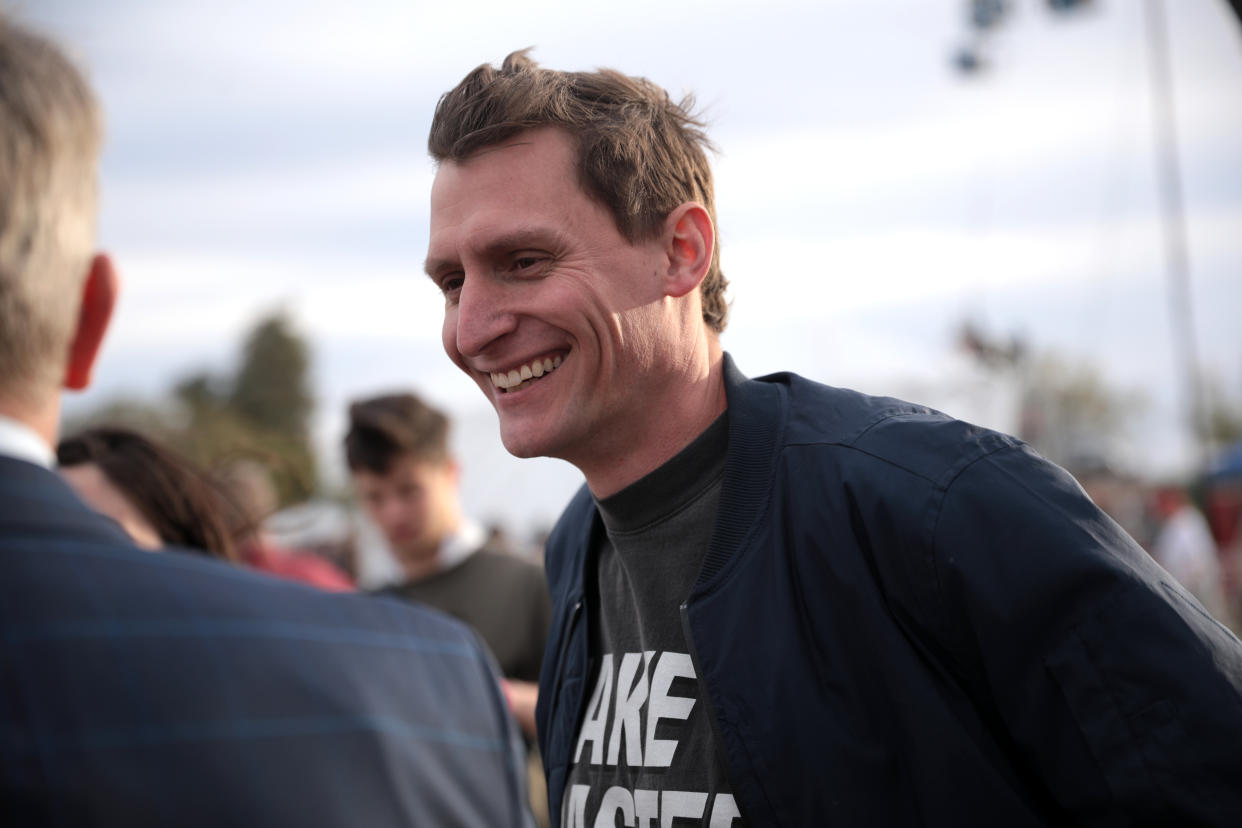
“With the national mood turning so strongly against the Biden administration and Democratic control of Congress, a Republican candidate should have a relatively easy time recapturing the seat in Arizona this cycle,” says Robert Robb, a longtime columnist for the Arizona Republic and former GOP political consultant. “But these candidates are weak candidates. Whatever this ‘new right’ thing is, I don’t think that it necessarily fits Arizona.”
Masters and Vance are also both favorites of top Fox News host Tucker Carlson, who trumpets their emerging strain of right-wing nationalism to more than 3 million viewers every weeknight on cable TV.
“The Republican Party is getting better, much better,” Carlson said last July. “We know that because of two new Republican Senate candidates” — Vance and Masters. Like Carlson, Masters rails against elites on both sides of the aisle, and appears quite comfortable with deploying state power against anyone who contradicts their version of American greatness, corporations included.

In the Arizona Republican primary, Masters is still polling a few percentage points behind the top two candidates: Attorney General Mark Brnovich, the early frontrunner, and wealthy solar power executive Jim Lamon, who has spent more on advertisements ($3.8 million) than anyone else.
But then again, Vance was in precisely the same third-place position before Trump — urged on by Carlson and Donald Trump Jr. — came off the sidelines and endorsed him on April 15. Vance won Tuesday by nearly 10 percentage points.
So is Masters the next candidate to get a bounce from a Trump endorsement?
Masters is certainly counting on it. On Tuesday night, he retweeted a message from far-right Human Events host Jack Posobiec touting Vance’s win and declaring that “The biggest question now is: Who should Trump endorse in AZ primary?” A few hours later, Masters retweeted a poll posted by Arizona GOP Chair Kelli Ward, herself a former U.S. Senate candidate. “Who do you want President Trump to endorse in the AZ Senate primary?” Ward asked. Nearly 90% of the 3,000-plus respondents picked Masters.
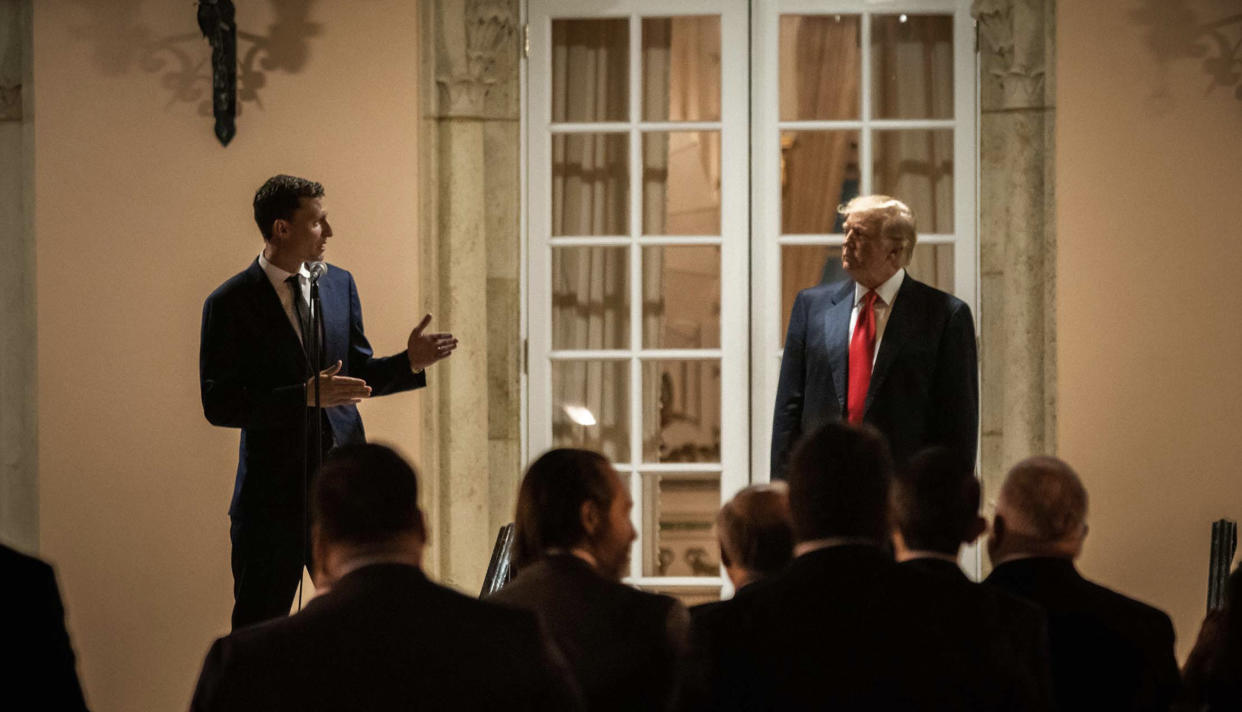
There are signs that Trump — who said last month that he “will be making an [Arizona] endorsement in the not too distant future” — is leaning toward Masters, who Donald Trump Jr. also reportedly favors. Last Saturday the former president dialed into a Masters “election integrity” rally to praise the candidate for echoing his false claims of widespread 2020 election fraud — and to trash Brnovich for overseeing several investigations of the election but refusing to overturn the results.
“He found all sorts of things, but he didn’t want to do anything about it,” said Trump, who previously accused Brnovich of being too “politically correct” to “go after the people [who] committed these election crimes.”
“I heard Blake was the person that showed up,” Trump added. “And I want to thank Blake.”
If Masters does snag Trump’s endorsement, it remains to be seen whether he will follow Vance’s path in the polls. But at the very least, a bigger spotlight would trigger more scrutiny of the self-described “anti-progressive,” who has spent much of his Senate campaign releasing slick online ads designed to trigger liberals and go viral on right-wing Twitter — yet hasn’t attracted nearly as much national coverage as Vance.
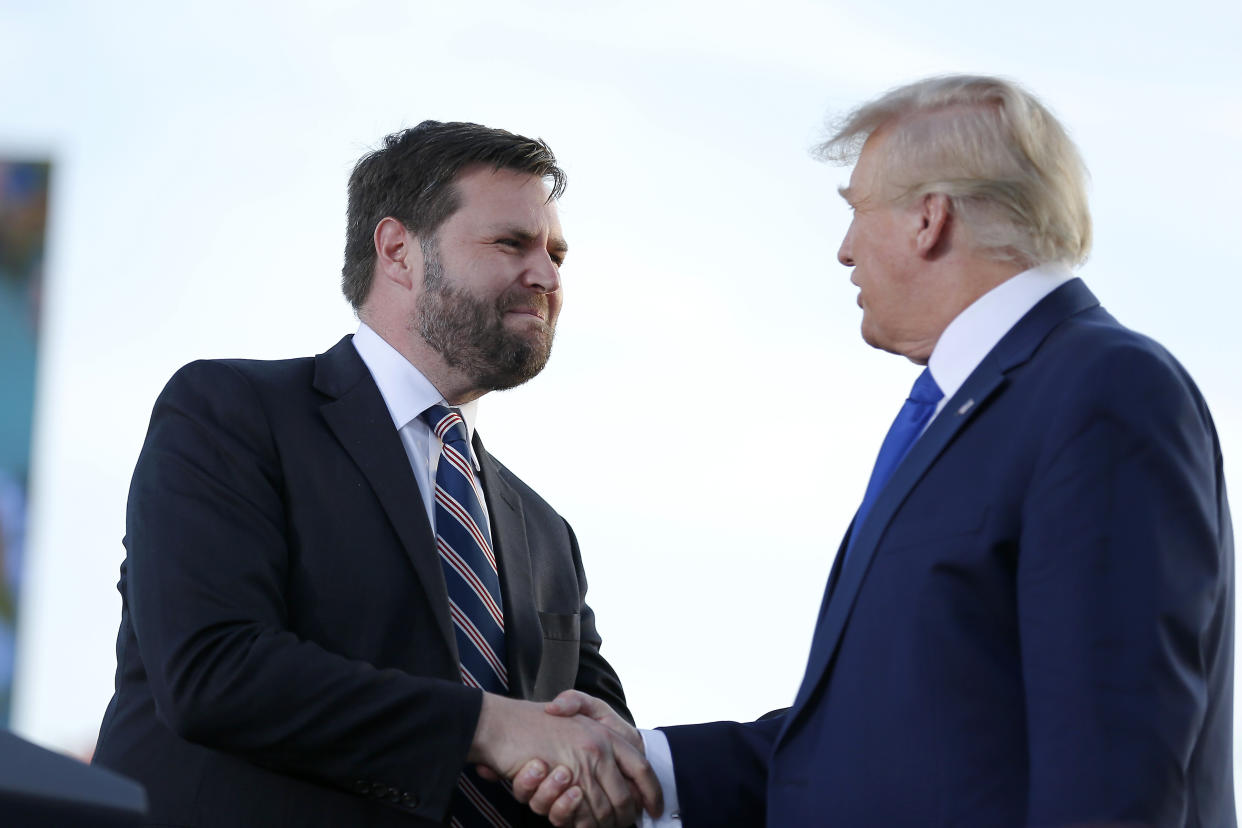
The son of a libertarian who steered him toward Ayn Rand, Ron Paul and the Austrian economist Ludwig von Mises, Masters grew up in Tucson but left for college at Stanford. At 19, he wrote an essay that approvingly quoted Nazi leader Hermann Goering to argue that the “U.S. hasn’t been involved in a just war in over 140 years.” (Responding to a recent Jewish Insider story about that essay, written in opposition to the Iraq War and published on the website of radical libertarian Lew Rockwell, Masters admitted he “went too far.”)
At Stanford Law, Masters took a course on startups taught by Thiel, then a libertarian himself — and a Silicon Valley outlier. Galvanized by Thiel’s contrarian thinking, Masters posted his detailed class notes on Tumblr; David Brooks wrote an entire New York Times column about them. Then Thiel and Masters spun those same notes into a book called “Zero to One.” Masters spent the next eight years serving in top positions at Thiel’s foundation and venture capital firm. In 2016, Thiel backed Trump, and Masters followed him to Trump Tower to help with the transition after the election.
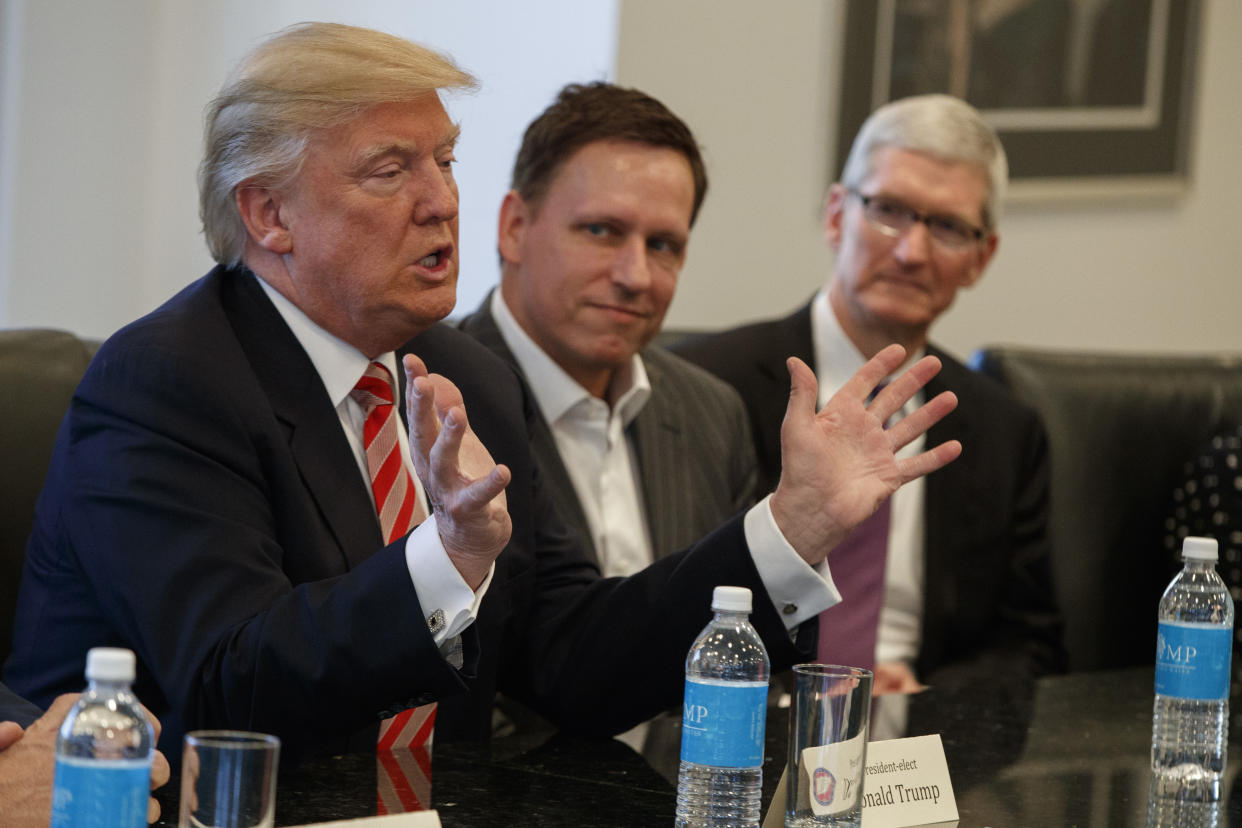
The key lesson of Thiel’s course — “Instead of being slightly better than everybody else in a crowded and established field,” as Brooks put it, “it’s often more valuable to create a new market and totally dominate it” — appears to be the strategy behind Masters’s campaign as well.
“We’re living through a period of American decline, as well as a massive consolidation of power in both government and corporations,” Masters told the Stanford Review last September. “I think sounding different and looking different is how you break through.”
To that end, Masters has cradled a short-barreled rifle in one ad while declaring that it “wasn’t designed for hunting.” “This,” he said, “is designed to kill people. But if you’re not a bad guy, I support your right to own one. The Second Amendment is not about duck hunting. It’s about protecting your family and your country.”
He has characterized the Democrats who are “running the country” — “Biden, Pelosi, Schumer, Mark Kelly” — as “psychopaths.” He has claimed that “Trump won in 2020,” despite all evidence to the contrary. He has said he wants to slash legal immigration in half because “we do not need hundreds of thousands of people from India and China to come in every year to take coding jobs.”

And Masters has named Lee Kuan Yew — the founder of modern Singapore who used “a soft form of authoritarianism” to create a wealthy nation in a struggling corner of the world — as one of his favorite historical figures, citing him as an example of “what one committed person can do to change things” in a way that is “more conservative than libertarian.”
With Masters, as with Vance, it’s unclear how much of this is principle and how much is posturing — an attempt to earn Trump’s endorsement and corner the MAGA base. (Vance was frequently accused of flip-flopping and opportunism during his primary campaign.) But in their flirtations with authoritarianism, at least, both candidates are embracing elements of right-wing thought that go beyond Trumpism.
For this reason and others, Robb — the Arizona Republic columnist and former GOP consultant — thinks Masters is too “odd” to beat Kelly. “His own ads are pretty disturbing from a general election context,” he told Yahoo News.
“To the extent you need to make a pivot after the primary, he’s provided enough footage on his own dime to cause him serious problems.”
